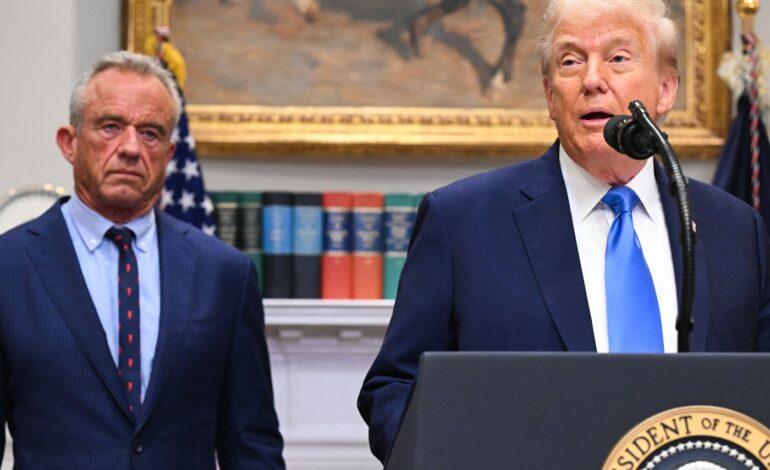Trump and Kennedy Face Backlash Over Controversial Health Claims

In a surprising and controversial statement, former President Donald Trump announced that the U.S. Food and Drug Administration (FDA) will alert physicians about the alleged risks of taking acetaminophen, commonly known as Tylenol, during pregnancy. Trump claimed that using the medication could significantly increase the risk of autism, a statement that has drawn immediate backlash from medical experts and some political figures.
During a recent press conference at the White House, Trump struggled to articulate his message, fumbling over the name of the drug. His declaration echoed support for claims made by Robert F. Kennedy Jr., the Secretary of Health and Human Services, who has been criticized for promoting pseudoscientific views. Scientists swiftly condemned Trump’s remarks, emphasizing the lack of credible evidence to support these assertions.
Dr. Helen Tager-Flusberg, director of the Center for Autism Research Excellence at Boston University, described the announcement as “appalling” and a “very significant distortion” of current scientific understanding. The Coalition of Autism Scientists also responded, stating, “The data cited do not support the claim that Tylenol causes autism and leucovorin is a cure, and only stoke fear and falsely suggest hope when there is no simple answer.”
The fallout from Trump’s comments was swift. Dr. Mehmet Oz, the administrator of the Centers for Medicare and Medicaid Services, appeared on Fox News to clarify the situation. He stated, “The message is not, ‘Never take Tylenol,’” instead advising people to consult their doctors before taking any medication. This direct contradiction to Trump’s earlier statements highlights the internal dissent within the administration regarding health messaging.
Adding to the confusion, Fox News medical analyst Dr. Marc Siegel affirmed that there is “absolutely no proof whatsoever” linking acetaminophen to autism, further undermining the credibility of Trump’s claims.
Politicians from both sides of the aisle have expressed concern over the implications of such statements. Senate Majority Leader John Thune voiced his worries on CNN, insisting that “science ought to guide these discussions.” Meanwhile, Senator Bill Cassidy, a licensed physician, called for the Department of Health and Human Services to release supporting data for their claims. He remarked on social media that the overwhelming evidence does not suggest a link between acetaminophen and autism.
The Wall Street Journal editorial board criticized Trump and Kennedy’s campaign against Tylenol, suggesting that it is driven more by personal interests and ongoing lawsuits against the medication’s manufacturer than by legitimate health concerns. They stated, “What’s going on here has less to do with healthcare than with a campaign by the plaintiffs bar.” The editorial pointed to the influence of Kennedy, who has been known to advocate for unfounded health theories, suggesting that his ties to litigation efforts could be influencing these claims.
Reflecting on Trump’s delivery, it is unclear whether he fully believes the assertions he made. He stated, “This is based on what I feel,” and attempted to distance himself from the medical community by saying, “I’m not a doctor, but I’m giving my opinion.” When challenged about the appropriateness of his statements, he responded, “Absolutely appropriate.” Such comments raise concerns about the potential ramifications of mixing personal beliefs with public health guidance.
The controversy surrounding Trump’s statements not only impacts public trust in health advisories but also highlights a broader issue of how political figures communicate scientific information. As the situation develops, the importance of relying on qualified medical professionals rather than political figures for health advice remains paramount.






